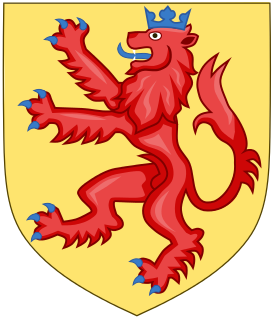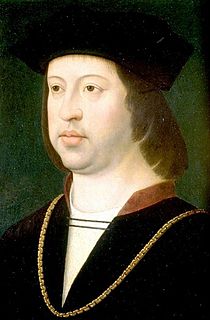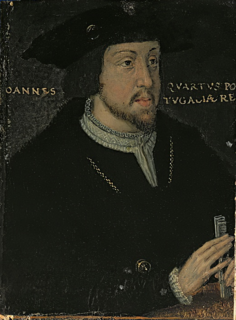
Afonso V, known by the sobriquet the African, was a King of Portugal. His sobriquet refers to his military conquests in Northern Africa.

Alphons is a male given name recorded from the 8th century in the Christian successor states of the Visigothic kingdom in the Iberian peninsula. In the later medieval period it became a standard name in the Hispanic and Portuguese royal families.

The House of Habsburg, alternatively spelled Hapsburg in English, also known as the House of Austria, is a German dynasty which was once one of the most prominent royal houses of Europe in the 2nd millennium.

Ferdinand is a Germanic name composed of the elements frith "protection", frið "peace" or alternatively farð "journey, travel", Proto-Germanic *farthi, abstract noun from root *far- "to fare, travel", and nanth "courage" or nand "ready, prepared" related to Old High German nendan "to risk, venture."

John II, called the Perfect Prince, was King of Portugal from 1481 until his death in 1495, and also for a brief time in 1477. He is known for re-establishing the power of the Portuguese monarchy, reinvigorating the Portuguese economy, and renewing his country's exploration of Africa and Asia.

John II of Castile was King of Castille and León from 1406 to 1454. He succeeded his older sister, Maria of Castile, Queen of Aragon, as Prince of Asturias in 1405.

John I, also called John of Aviz, was King of Portugal from 1385 until his death in 1433. He is recognized chiefly for his role in Portugal's victory in a succession war with Castile, preserving his country's independence and establishing the Aviz dynasty on the Portuguese throne. His long reign of 48 years, the most extensive of all Portuguese monarchs, saw the beginning of Portugal's overseas expansion. John's well-remembered reign in his country earned him the epithet of Fond Memory ; he was also referred to as "the Good", sometimes "the Great", and more rarely, especially in Spain, as "the Bastard" (Bastardo).

Ferdinand I, sometimes called the Handsome or occasionally the Inconstant, was the King of Portugal from 1367 until his death in 1383. His death led to the 1383–85 crisis, also known as the Portuguese interregnum.
Philip(p) I may refer to:
King Philip may refer to

The House of Aviz, also known as the Joanine Dynasty, was a dynasty of Portuguese origin which flourished during the Renaissance and the period of the Portuguese discoveries, when Portugal expanded its power globally.
John of Portugal, occasionally surnamed Castro, was the eldest surviving son of King Peter I of Portugal by his mistress Inês de Castro. He was a potential but unsuccessful contender for the Portuguese throne during the 1383–85 crisis of succession.
Philip or Philippe, Duke of Brabant may refer to:

Dom Fernando II of Braganza was the 3rd Duke of Braganza and the 1st Duke of Guimarães, among other titles. He is known for being executed for treason against the King.
Handsome may refer to:

Philip, also Phillip, is a male given name, derived from the Greek Φίλιππος, from a compound of φίλος and ἵππος. Prominent Philips who popularized the name include kings of Macedonia and one of the apostles of early Christianity.